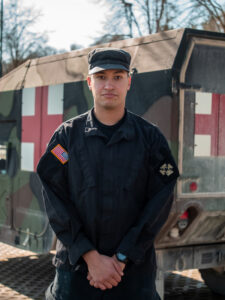
Story by Sgt. Davis Rohrer
153rd Public Affairs Detachment
The weight of an injured comrade pressing against the netting of a litter, worn bandages accompanied by the constriction of a tourniquet, and three Soldiers pulling together to lift the casualty for quick evacuation – this was the scene during a 919th Ground Ambulance Company aid and litter exercise as part of Allied Spirit 24, while serving as U.S. Army Combat Medics near Hohenfels, Germany, March 9, 2024.
The United States Army has a global scope, whether it is in a deployed environment or a multinational training mission. Normally, larger units with established histories take the lead, but during Allied Spirit 24, an extremely high tempo multinational training exercise facilitated by the U.S. Army for its NATO Allies and partners, reserve-component Soldiers of the U.S. Army are playing a significant role during training operations.
U.S. Army Pfc. Nicolas Knull, a combat medic of the Army Reserve’s 919th Ground Ambulance Company, based out of Colorado, is one of the Soldiers that is showcasing the importance of part-time service members being seamlessly integrated into active-duty units.
Knull, a 29-year old native of Manhattan, New York, enlisted into the U.S. Army Reserve on September 9, 2022, as a Combat Medic Specialist, the second largest career field in the United States Army. The U.S. Army’s Medical Corps has approximately 39,000 Soldiers across active and reserve-components.
“The mission for us here at the aid station is to provide care for soldiers who come in for sick-call.” Knull said, “It’s also to provide emergency care to anyone and any real world casualties during this training exercise.”
Knull’s duties as a combat medic in the Army Reserve is the same as combat medics in the active-duty force. This means providing immediate medical care to injured or sick servicemembers, and performing tactical combat casualty care to wounded troops in combat environments, both in training and real world missions.
The 919th’s mission during Allied Spirit 24 is to provide immediate care to the U.S. Army’s 1st Battalion, 4th Infantry Regiment, who is acting as the opposing forces, or OPFOR during the exercise. The OPFOR’s mission is to engage NATO allies and partners in various combat scenarios revolving around small arms, armored vehicles, and even modern situations like drone strikes.
When asked what is expected of him as a combat medic, Knull said that “stabilizing them out in the field, transporting them out of the field, and getting them on the next echelon of care they need.”
The OPFOR tests the limits daily of all the nations participating in Allied Spirit 24. The OPFOR Soldiers continue to rely on the 919th, including Knull, to provide expediatent and dependable medical care in real world situations.
“I have a lot of junior Soldiers with me, and a lot of them haven’t been in this environment before,” said Knull’s noncommissioned officer in charge, U.S. Army Sgt. First Class Kahala Martin. “This makes Allied Spirit 24 a great opportunity to incorporate and integrate our unit into the larger fight.”
Knull said that he is glad he had the opportunity to participate in an exercise at this scale.
“It’s a great opportunity, and I have been having a lot of fun.” Knull said.
On March 13, 2024, Knull received a challenge coin, a token of success in the U.S. Army, from U.S. Army Maj. Gen. Beth A. Salisbury, 807th Medical Command commander. Salisbury awards these coins to Soldiers who stood out amongst their peers, and are recognized for their excellence from their leadership.
Knull stands as an example for more than just how combat medics in the Army Reserve can make a difference, but how all reserve-component servicemembers can perform at the same tempo and excellence of active-duty.